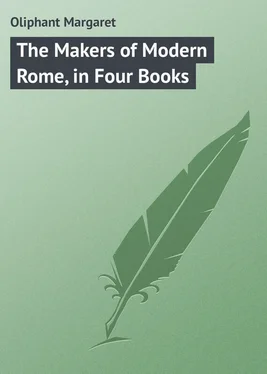Margaret Oliphant - The Makers of Modern Rome, in Four Books
Здесь есть возможность читать онлайн «Margaret Oliphant - The Makers of Modern Rome, in Four Books» — ознакомительный отрывок электронной книги совершенно бесплатно, а после прочтения отрывка купить полную версию. В некоторых случаях можно слушать аудио, скачать через торрент в формате fb2 и присутствует краткое содержание. Жанр: foreign_prose, на английском языке. Описание произведения, (предисловие) а так же отзывы посетителей доступны на портале библиотеки ЛибКат.
- Название:The Makers of Modern Rome, in Four Books
- Автор:
- Жанр:
- Год:неизвестен
- ISBN:нет данных
- Рейтинг книги:5 / 5. Голосов: 1
-
Избранное:Добавить в избранное
- Отзывы:
-
Ваша оценка:
- 100
- 1
- 2
- 3
- 4
- 5
The Makers of Modern Rome, in Four Books: краткое содержание, описание и аннотация
Предлагаем к чтению аннотацию, описание, краткое содержание или предисловие (зависит от того, что написал сам автор книги «The Makers of Modern Rome, in Four Books»). Если вы не нашли необходимую информацию о книге — напишите в комментариях, мы постараемся отыскать её.
The Makers of Modern Rome, in Four Books — читать онлайн ознакомительный отрывок
Ниже представлен текст книги, разбитый по страницам. Система сохранения места последней прочитанной страницы, позволяет с удобством читать онлайн бесплатно книгу «The Makers of Modern Rome, in Four Books», без необходимости каждый раз заново искать на чём Вы остановились. Поставьте закладку, и сможете в любой момент перейти на страницу, на которой закончили чтение.
Интервал:
Закладка:
It is indeed a touching association with that portion of Scripture which next to the Gospel is most dear to the devout, that the translation still in daily use throughout the churches of Continental Europe, the sonorous and noble words which amid all the babble of different tongues still form a large universal language, of which all have at least a conventional understanding – should have been thus transcribed and perfected for the use of the generations. Jerome is no gentle hero, and, truth to tell, has never been much loved in the Church which yet owes so much to him. Yet there is no other work of the kind which carries with it so many soft and tender associations. The cave at Bethlehem is as little adapted as a scene for that domestic combination as Jerome is naturally adapted to be its centre. And no doubt there are unkindly critics who will describe this austere yet beautiful interior as the workshop of two poor female slaves dragged after him by the tyranny of their grim taskmaster to do his work for him. No such idea is consistent with the record. The gentle Paula was a woman of high spirit as well as of much grace and courtesy, steadfastness and humour, the last the most unusual quality of all. The imaginative devotion which had induced her to learn Hebrew in order to sing the Psalmist's songs in the original, among the little band of Souls, under Marcella's gilded roof, had its natural evolution in the gentle pressure laid upon Jerome to make of them an authoritative translation: and where could so fit a place for this work have been found as in the delightful rest after their travels were over, in the very scene where these sacred songs were first begun? It would be almost as impertinent and foolish to suppose that any modern doubt of their authenticity existed in Paula's mind as to suggest that these were forced and dreary labours to which she was driven by a spiritual tyrant. To our mind this mutual labour and study adds the last charm to their companionship. The sprightly, gentle woman who shed so much light over that curious self-denying yet self-indulgent life, and the grave young daughter who never left her side, whose gentle shadow is one with her, so that while Paula lived we cannot distinguish them apart – must have found a quiet happiness above all they had calculated on in this delightful intercourse and work. Their minds and thoughts occupied by the charm of noble poetry, by the puzzle of words to be cleared and combined aright, and by constant employment in a matter which interested them so deeply, which is perhaps the best of all – must have drawn closer and ever closer, mother to child, and child to mother, as well as both to the friend and father whom they delighted to serve, and whose large intellect and knowledge kept theirs going in constant sympathy – not unmingled with now and then a little opposition, and the pleasant stir of independent opinion.
It is right to give Jerome himself, so fierce in quarrel and controversy, the advantage of this gentle lamp which burns for ever in his little Paradise. And can any one suppose that Paula, once so sensitive and exquisite, now strong and vigorous in the simplicity of that retirement, with her hands full and her mind, plenty to think of, plenty to do, had not her advantage also? The life would be ideal but for the thought that must have come over her by times, of the young ones left in Rome, and what was happening to them. She was indeed prostrated by grief again and again by the death of her daughters there, one after another, and mourned with a bitterness which makes us wonder whether that haunting doubt and self-censure, which perhaps gave an additional sting to her sorrow in the case of Blæsilla, may not have overwhelmed her heart again though on a contrary ground – the doubt whether perhaps the austerities she enjoined and shared had been fatal to one, the contradictory doubt whether to leave them to the usual course of life might not have been fatal to the others. Such a woman has none of the self-confidence which steels so many against fate – and, finding nothing effectual for the safety of those she loved, neither a sacred dedication nor that consent to commonplace happiness which is the ordinary ideal of a mother's duty, might well sometimes fall into despair – a despair silently shared by many a trembling heart in all ages, which finds its best-laid plans, though opposite to each other, fall equally into downfall and dismay.
But she had her compensations. She had her little glory, too, in the books which went forth from that seclusion in Bethlehem, bearing her name, inscribed to her and her child by the greatest writer of the time. "You, Paula and Eustochium, who have studied so deeply the books of the Hebrews, take it, this book of Esther, and test it word by word; you can tell whether anything is added, anything withdrawn: and can bear faithful witness whether I have rendered aright in Latin this Hebrew history." Few women would despise such a tribute, and fewer still the place of these two women in the Paradise of that laborious study, and at the doors of that beautiful Hospice on the Jerusalem road, where Joseph and Mary had they but come again would have run no risk of finding room!
They died all three, one after another, and were laid to rest in the pure and wholesome rock near the sacred spot of the Nativity. There is a touching story told of how Eustochium, after her mother's death, when Jerome was overwhelmed with grief and unable to return to any of his former occupations, came to him with the book of Ruth still untranslated in her hand, at once a promise and an entreaty. "Where thou goest I will go. Where thou dwellest I will dwell" – and a continuation at the same time of the blessed work which kept their souls alive.
CHAPTER VI.
THE MOTHER HOUSE
Amid all these changes the house on the Aventine – the mother house as it would be called in modern parlance – went on in busy quiet, no longer visible in that fierce light which beats upon the path of such a man as Jerome, doing its quiet work steadily, having a hand in many things, most of them beneficent, which went on in Rome. Albina the mother of Marcella, and Asella her elder sister, died in peace: and younger souls, with more stirring episodes of life, disturbed and enlivened the peace of the cloister, which yet was no cloister but open to all the influences of life, maintaining a large correspondence and much and varied intercourse with the society of the times. In the first fervour of the settlement in Bethlehem both Paula and Jerome (she by his hand) wrote to Marcella urging her to join them, to forsake the world in a manner more complete than she had yet done. "… You were the first to kindle the fire in us" (the letter is nominally from Paula and Eustochium): "the first by precept and example to urge us to adopt our present life. As a hen gathers her chickens, who fear the hawk and tremble at every shadow of a bird, so did you take us under your wing. And will you now let us fly about at random with no mother near us?"
This letter is full not only of affectionate entreaties but of delightful pictures of their own retired and peaceful life. "How shall I describe to you," the writer says, "the little cave of Christ, the hostel of Mary? Silence is more respectful than words, which are inadequate to speak its praise. There are no lines of noble colonnades, no walls decorated by the sweat of the poor and the labour of convicts, no gilded roofs to intercept the sky. Behold in this poor crevice of the earth, in a fissure of the rock, the builder of the firmament was born." She goes on with touching eloquence to put forth every argument to move her friend.
Read the Apocalypse of St. John and see there what he says of the woman clothed in scarlet, on whose forehead is written blasphemy, and of her seven hills, and many waters, and the end of Babylon. "Come out of her, my people," the Lord says, "that ye be not partakers of her sins." There is indeed there a holy Church; there are the trophies of apostles and martyrs, the true confession of Christ, the faith preached by the apostles, and heathendom trampled under foot, and the name of Christian every day raising itself on high. But its ambition, its power, the greatness of the city, the need of seeing and being seen, of greeting and being greeted, of praising and detracting, hearing or talking, of seeing, even against one's will, all the crowds of the world – these things are alien to the monastic profession and they have spoiled Rome, they all oppose an insurmountable obstacle to the quiet of the true monk. People visit you: if you open your doors, farewell to silence: if you close them, you are proud and unfriendly. If you return their politeness, it is through proud portals, through a host of grumbling insolent lackeys. But in the cottage of Christ all is simple, all is rustic: except the Psalms, all is silence: no frivolous talk disturbs you, the ploughman sings Allelujah as he follows his plough, the reaper covered with sweat refreshes himself with chanting a psalm, and it is David who supplies with a song the vine dresser among his vineyards. These are the songs of the country, its ditties of love, played upon the shepherd's flute. Will the time never come when a breathless courier will bring us the good news, your Marcella has landed in Palestine? What a cry of joy among the choirs of the monks, among all the bands of the virgins! In our excitement we wait for no carriage but go on foot to meet you, to clasp your hand, to look upon your face. When will the day come when we shall enter together the birthplace of Christ: when, leaning over the divine sepulchre, we weep with a sister, a mother, when our lips touch together the sacred wood of the Cross: when on the Mount of Olives our hearts and souls rise together in the rising of our Lord? Would not you see Lazarus coming out of his tomb, bound in his shroud? and the waters of Jordan purified for the washing of the Lord? Then we shall hasten to the shepherds' folds, and pray at the tomb of David. Listen, it is the prophet Amos blowing his shepherd's horn from the height of his rock; we shall see the monuments of Abraham, Isaac and Jacob, and the three famous women, and Samaria and Nazareth, the flower of Galilee, and Shiloh and Bethel and other holy places, accompanied by Christ, where churches rise everywhere like standards of the victories of Christ. And when we return to our cavern we will sing together always, and sometimes we shall weep; our hearts wounded with the arrow of the Lord, we will say one to another, "I have found Him whom my soul loveth; I will hold Him, and will not let Him go!"
Читать дальшеИнтервал:
Закладка:
Похожие книги на «The Makers of Modern Rome, in Four Books»
Представляем Вашему вниманию похожие книги на «The Makers of Modern Rome, in Four Books» списком для выбора. Мы отобрали схожую по названию и смыслу литературу в надежде предоставить читателям больше вариантов отыскать новые, интересные, ещё непрочитанные произведения.
Обсуждение, отзывы о книге «The Makers of Modern Rome, in Four Books» и просто собственные мнения читателей. Оставьте ваши комментарии, напишите, что Вы думаете о произведении, его смысле или главных героях. Укажите что конкретно понравилось, а что нет, и почему Вы так считаете.












